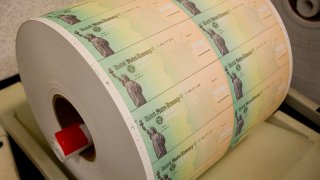
Another round of stimulus payments is on the way for the millions of Americans financially struggling because of the public health crisis.
President Donald Trump on Sunday night signed a $900 billion coronavirus relief package into law, days after he suggested he would block the bill if the stimulus checks weren’t raised to $2,000, from $600. (That never happened: House Republicans quickly shot down Democrats’ attempts at passing $2,000 payments.)
The last sweeping aid package Congress passed in March, the $2.2 trillion CARES Act, authorized stimulus checks of up to $1,200 per person. After months of negotiations between Republicans and Democrats over the shape of the second relief bill, they agreed to make the checks $600.
The legislation also gives unemployed people a $300 a week federal boost for at least 10 weeks and makes food stamps payments more generous, among many other provisions in the 5,500-page bill.
Here’s what you need to know about this latest round of stimulus checks.
How much will the payments be?
The new checks will be for up to $600 per adult and $600 per child.
Money Report
Individuals with up to $75,000 in adjusted gross income will receive that full payment, as will heads of household earning up to $112,500 and married couples making up to $150,000.
Those with earnings above these levels will receive a partial payment that drops by $5 for every $100 in income.
If you earned much less in 2020 than in 2019, you may not receive a stimulus payment but can still claim this money in the form of a tax credit when you file.
When will I get my check?
If the IRS has your direct deposit information, you'll be among the first to receive the payment. The check could be in your account within two weeks.
Those who haven't shared that information with the IRS can expect to get a paper check or prepaid debit card — and, unfortunately, to wait longer for their money.
The Treasury can deliver 5 million to 7 million paper checks a week.
When the first checks were deployed in March, one Congressional timeline estimated it would take up to 20 weeks to get the money out. However, millions of eligible people are still waiting.
What if I still didn't receive my first stimulus check?
When you file your 2020 taxes, you can claim what is known as a "recovery rebate credit."
This credit will either leave you with a larger tax refund or decrease the tax you owe.
Additional reporting by Lorie Konish






